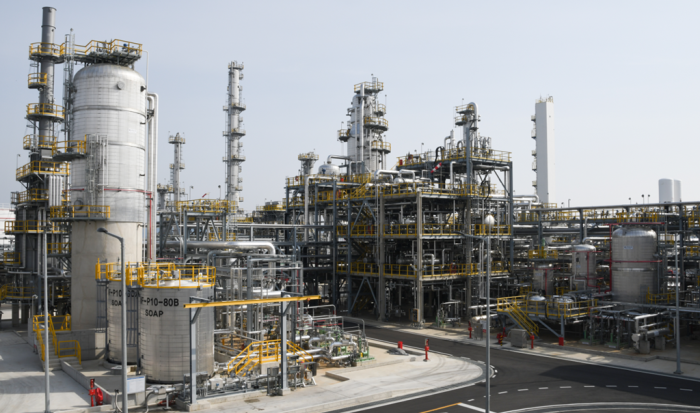Energy
HD Hyundai Oilbank kicks off biodiesel mass production
Its biodiesel plant can use non-edible feedstock such as palm oil residue, cutting the reliance on food resources
By Apr 18, 2024 (Gmt+09:00)
1
Min read
Most Read
LG Chem to sell water filter business to Glenwood PE for $692 million


Kyobo Life poised to buy Japan’s SBI Group-owned savings bank


KT&G eyes overseas M&A after rejecting activist fund's offer


StockX in merger talks with Naver’s online reseller Kream


Mirae Asset to be named Korea Post’s core real estate fund operator



HD Hyundai Oilbank Co., South Korea’s refiner backed by Saudi Aramco, started mass production of biodiesel to expand its eco-friendly energy business at home and abroad.
HD Hyundai Oilbank, a subsidiary of South Korean shipbuilding and machinery conglomerate HD Hyundai Co., said on Thursday it has begun commercial operations of its biodiesel facility with an annual capacity of 130,000 tons at its Daesan petrochemical complex in Seosan, 130 km southwest of Seoul.
Biodiesel is a renewable biofuel, a form of diesel fuel, derived from biological sources like vegetable oils, animal fats, or recycled greases, and consisting of long-chain fatty acid esters.
Biodiesel, which emits fewer greenhouse gases than regular diesel, has long been commercialized along with aviation biofuel and marine biofuel oil. Under current South Korean law, biodiesel must be mixed with regular diesel at a maximum 4% level with a plan to double the ratio to 8% in 2030.
“We aim to accelerate the transformation into a comprehensive eco-friendly energy provider by seeking to export biodiesel in the future,” HD Hyundai Oilbank CEO Chu Young-min said in a statement.
USES NON-EDIBLE FEEDSTOCK TO CUT RELIANCE ON FOOD RESOURCES
HD Hyundai Oilbank was the first to introduce the supercritical process in the country, to the plant that produces biodiesel without catalysts under high temperatures and pressures.
The method allows HD Hyundai Oilbank to use non-edible feedstocks such as palm oil residue, which is difficult to process due to high acidity, cutting the reliance on food resources compared to the existing technology, the refiner said.
HD Hyundai Oilbank has already formed a partnership with South Korea’s Lotte Wellfood Co., formerly Lotte Confectionary Co., to secure biodiesel feedstock including used cooking oil.
The refiner is poised to supply its biodiesel to Lotte Group affiliates for delivery trucks and other purposes.
Write to Hyung-Kyu Kim at khk@hankyung.com
Jongwoo Cheon edited this article.
More to Read
-
 Carbon neutralityHD Hyundai Oilbank secures bio-based material supply network
Carbon neutralityHD Hyundai Oilbank secures bio-based material supply networkOct 31, 2023 (Gmt+09:00)
1 Min read -
 PetrochemicalsHD Hyundai Oilbank changing into eco-friendly energy entity
PetrochemicalsHD Hyundai Oilbank changing into eco-friendly energy entitySep 27, 2023 (Gmt+09:00)
1 Min read -
 Carbon neutralityHyundai Oilbank, Lotte Confectionery tie up for biodiesel business
Carbon neutralityHyundai Oilbank, Lotte Confectionery tie up for biodiesel businessAug 02, 2022 (Gmt+09:00)
1 Min read
Comment 0
LOG IN


